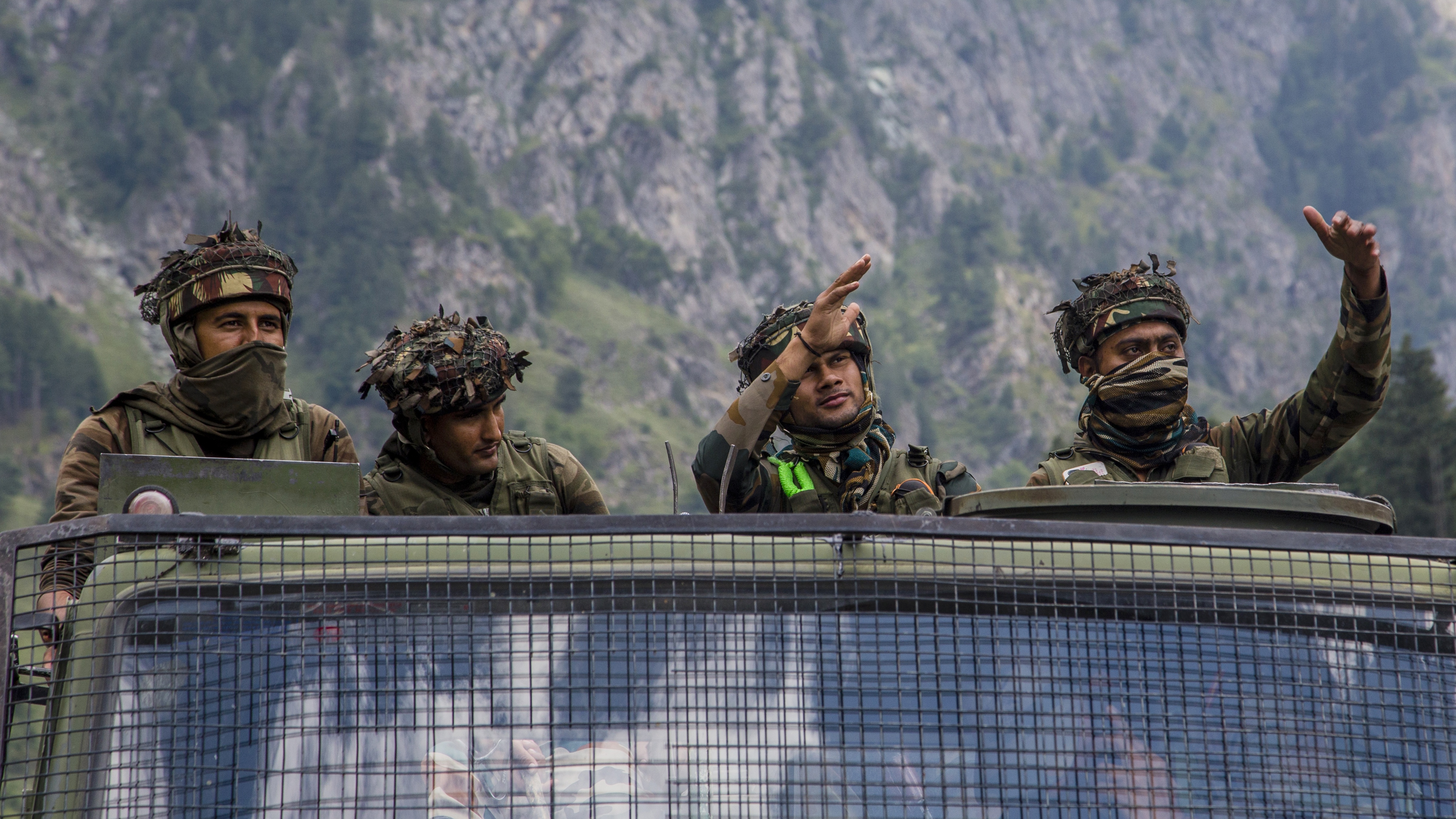China uses microwave weapons to blast Indian troops in disputed border region
The radiation technology left soldiers vomiting and incapacitated without breaking no-live-shots rule

A free daily email with the biggest news stories of the day – and the best features from TheWeek.com
You are now subscribed
Your newsletter sign-up was successful
China got round a no-live-shots agreement during a border stand-off in the Himalayas by deploying microwave weapons to “cook” enemy troops from India, a Beijing-based academic has claimed.
The Chinese military used “high-energy electromagnetic radiation” technology to effectively turn “two strategic hilltops that had been occupied by Indian soldiers into a microwave oven”, The Times reports.
The attack left the Indian troops “vomiting” and unable to stand within 15 minutes, enabling the People’s Liberation Army to “retake two strategically important hilltops in the Himalayas without any exchange of live fire”, according to Jin Canrong, a professor of international relations at China’s Renmin University.
The Week
Escape your echo chamber. Get the facts behind the news, plus analysis from multiple perspectives.

Sign up for The Week's Free Newsletters
From our morning news briefing to a weekly Good News Newsletter, get the best of The Week delivered directly to your inbox.
From our morning news briefing to a weekly Good News Newsletter, get the best of The Week delivered directly to your inbox.
The acadamic told attendees at a recent lecture that China didn’t publicise the victory, in late August, “because we solved the problem beautifully”.
“They [India] didn’t publicise it, either, because they lost so miserably,” he added.
The two sides have been locked in a border dispute in the Ladakh region since April, but have agreed a no-live-shots rule in a bid to avoid a repeat of the bloody 1962 Sino-Indian War.
However, troops from both sides have been killed during increasingly violent hand-to-hand combat, including a clash in June that saw the soldiers battering each other with iron sticks, bats and bamboo sticks studded with nails.
A free daily email with the biggest news stories of the day – and the best features from TheWeek.com
But now China appears to be using more sophisticated weapons, amid an ongoing failure to reach a settlement over the disputed region “despite a series of high-level talks”, says The Sun.
Microwave attacks use “beams of high-frequency electromagnetic radiation to heat the water in a human target’s skin, causing pain and discomfort”, the paper explains. “The weapons are not intended to do any lasting harm, though concerns have been raised about whether they could damage the eyes or have a carcinogenic impact in the long-term.”
The Times says that the US “deployed its own vehicle-mounted microwave weapon, called an Active Denial System, to Afghanistan ten years ago but it was withdrawn, reportedly without being used in combat”.
Similar weapons are suspected to have been used during an attack on US diplomats in the southern Chinese city of Guangzhou in 2018, and during alleged attacks against the US and Canadian embassies in Cuba’s capital Havana dating back to 2016.
Joe Evans is the world news editor at TheWeek.co.uk. He joined the team in 2019 and held roles including deputy news editor and acting news editor before moving into his current position in early 2021. He is a regular panellist on The Week Unwrapped podcast, discussing politics and foreign affairs.
Before joining The Week, he worked as a freelance journalist covering the UK and Ireland for German newspapers and magazines. A series of features on Brexit and the Irish border got him nominated for the Hostwriter Prize in 2019. Prior to settling down in London, he lived and worked in Cambodia, where he ran communications for a non-governmental organisation and worked as a journalist covering Southeast Asia. He has a master’s degree in journalism from City, University of London, and before that studied English Literature at the University of Manchester.
-
 Quiz of The Week: 14 – 20 February
Quiz of The Week: 14 – 20 FebruaryQuiz Have you been paying attention to The Week’s news?
-
 The Week Unwrapped: Do the Freemasons have too much sway in the police force?
The Week Unwrapped: Do the Freemasons have too much sway in the police force?Podcast Plus, what does the growing popularity of prediction markets mean for the future? And why are UK film and TV workers struggling?
-
 Properties of the week: pretty thatched cottages
Properties of the week: pretty thatched cottagesThe Week Recommends Featuring homes in West Sussex, Dorset and Suffolk
-
 Epstein files topple law CEO, roil UK government
Epstein files topple law CEO, roil UK governmentSpeed Read Peter Mandelson, Britain’s former ambassador to the US, is caught up in the scandal
-
 Iran and US prepare to meet after skirmishes
Iran and US prepare to meet after skirmishesSpeed Read The incident comes amid heightened tensions in the Middle East
-
 EU and India clinch trade pact amid US tariff war
EU and India clinch trade pact amid US tariff warSpeed Read The agreement will slash tariffs on most goods over the next decade
-
 Israel retrieves final hostage’s body from Gaza
Israel retrieves final hostage’s body from GazaSpeed Read The 24-year-old police officer was killed during the initial Hamas attack
-
 China’s Xi targets top general in growing purge
China’s Xi targets top general in growing purgeSpeed Read Zhang Youxia is being investigated over ‘grave violations’ of the law
-
 Panama and Canada are negotiating over a crucial copper mine
Panama and Canada are negotiating over a crucial copper mineIn the Spotlight Panama is set to make a final decision on the mine this summer
-
 Why Greenland’s natural resources are nearly impossible to mine
Why Greenland’s natural resources are nearly impossible to mineThe Explainer The country’s natural landscape makes the task extremely difficult
-
 Iran cuts internet as protests escalate
Iran cuts internet as protests escalateSpeed Reada Government buildings across the country have been set on fire